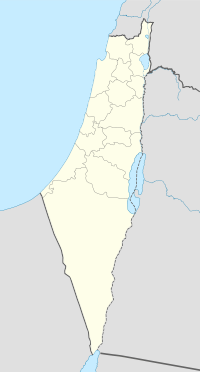Al-Jura
| al-Jura | |
|---|---|
| Arabic | الجورة |
| Name meaning | the Hollow |
| Subdistrict | Gaza |
| Coordinates | 31°39′54″N 34°33′15″E / 31.66500°N 34.55417°ECoordinates: 31°39′54″N 34°33′15″E / 31.66500°N 34.55417°E |
| Palestine grid | 107/119 |
| Population | 2,420 (1945) |
| Area | 12,224 dunams |
| Date of depopulation | November 4–5, 1948 |
| Cause(s) of depopulation | Military assault by Yishuv forces |
| Current localities | Ashkelon |
Al-Jura (Arabic: الجورة) was a Palestinian village that was depopulated during the 1948 Arab-Israeli war, located approximately two kilometers west of Majdal (both within the boundaries of present-day Ashkelon, Israel). In 1945, the village had a population of approximately 2,420 mostly Muslim inhabitants. Though defended by the Egyptian Army, al-Jura was nevertheless captured by Israel's Givati Brigade in a November 4, 1948 offensive as part of Operation Yoav.
A 1998 estimate of the population of refugees today who are descendants of those who fled al-Jura, placed the figure at 17,000. The founder and spiritual leader of the Hamas organization Ahmed Yassin was born in al-Jura.
Byzantine ceramics have been found here, together with coins dating to the seventh century CE.
In 1596, Al-Jura was part of the Ottoman Empire, nahiya (subdistrict) of Gaza under the liwa' (district) of Gaza, named Jawra/Jawrit al-Hajja, and it had a population of 253.
The Syrian Sufi teacher and traveller Mustafa al-Bakri al-Siddiqi (1688-1748/9) visited Al-Jura in the first half of the eighteenth century, before leaving for Hamama. In 1863 the French explorer Victor Guérin visited the village, which he called Djoura, and found it to have three hundred inhabitants, while an Ottoman village list from about 1870 found that the village had a population of 340, in a total of 109 houses, though the population count included men, only.
...
Wikipedia

